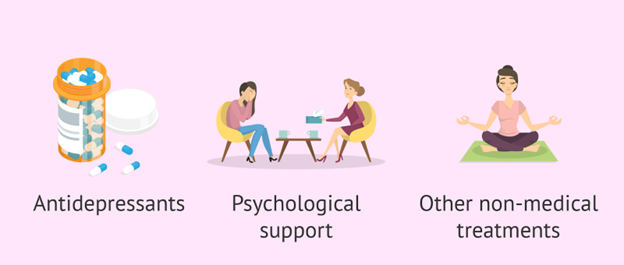Managing Postpartum Depression: A Complete Guide For Mothers

The birth of a baby is meant to be a time of celebration, yet postpartum depression casts a shadow over this experience. A significant but manageable mood disorder, it affects approximately 1 in 9 women within the first year post-delivery. Factors such as hormonal shifts, sleep deprivation, and the pressures of new parenthood contribute to its onset.
Unlike the temporary baby blues, postpartum depression persists and can endure for months or even years if untreated. In this comprehensive guide, we delve into the realms of understanding, managing, and seeking treatment for postpartum depression. From its origins to coping strategies, we shed light on this often misunderstood condition, empowering women to navigate their journey to recovery.
Recognizing the Signs of Postpartum Depression
Postpartum depression has many symptoms that can manifest physically, emotionally, and psychologically. Being aware of the most common signs can help new mothers identify when they need support:
- Fatigue and lack of motivation are typical symptoms, making even simple tasks feel impossible. Appetite and sleep are also often disrupted, even when the baby is sleeping.
- On the emotional front, persistent sadness, anxiety, irritability, emptiness, guilt, hopelessness, and worthlessness are common. There is often difficulty bonding with the baby and fear of being alone with the child.
- Some women experience intrusive thoughts of harming themselves or the baby. Postpartum depression can also trigger severe symptoms like hallucinations, paranoia, and delusions in extreme cases.
According to experts from CrowdWriter, if you are experiencing several of these symptoms daily for over two weeks, you may have postpartum depression rather than just the “baby blues.” Always seek emergency support if you have any urges to harm yourself or your baby. Postpartum depression is a treatable condition, but only if identified early.
Being aware of the many potential symptoms allows new mothers to recognize when something more serious than the baby blues may be occurring. Trust yourself if your instincts are telling you that something feels “off” emotionally after childbirth. Reach out early so you can get the support needed to fully enjoy motherhood.
Causes, Risk Factors, and Resilience

Welcoming a new life into the world is a momentous occasion, but for many new mothers, it can also bring about unexpected challenges. One such challenge that often remains shrouded in silence is postpartum depression (PPD).
This condition can cast a shadow over what should be a joyous time, affecting not only the mother’s well-being but also her ability to nurture the new life she’s brought into the world. Understanding the causes and risk factors associated with postpartum depression is crucial to offering the right support and interventions. Here’s a closer look at what contributes to this complex and often misunderstood condition:
- Hormonal Changes: Estrogen and progesterone levels drop suddenly after delivery. This chemical imbalance in the brain chemistry leads to mood disorders.
- Previous Mental Health Issues: Women with a history of depression, PTSD, anxiety, bipolar disorder are at higher risk.
- High Stress Levels: Single moms, marital/family problems, financial instability increase susceptibility.
- Traumatic Birth: Long labor, unplanned C-section, health issues in mother/baby can be triggers.
- Lack of Support System: Isolation and lack of help with the baby exacerbate depression.
- History of Abuse: Prior emotional, physical, sexual abuse make postpartum depression more likely.
- Sleep Deprivation: Not sleeping enough due to baby’s demands can worsen mood.
Strategies for Coping and Self-Care
Postpartum depression (PPD) can cast a shadow over the joyous moments, making self-care and coping strategies crucial tools for new mothers. Here’s a roadmap to effectively manage symptoms and nurture your well-being during this sensitive period:
- Communication is Key: Share your feelings with your partner, family, and friends. Don’t succumb to isolation; the support of loved ones can make a world of difference.
- Prioritize Rest: Lower your standards for housework and rest when your baby sleeps. Let dishes and laundry wait as you prioritize your well-being.
- Embrace the Outdoors: Spend time outdoors daily and soak in sunlight. Nature’s embrace can uplift your mood and offer a refreshing change of scenery.
- Incorporate Gentle Exercises: Engage in light exercises like walking, stretching, or prenatal yoga. Even a brief 10-minute daily session can work wonders for your mental and physical state.
- Prioritize Sleep and Nutrition: Ensure proper sleep and nourishment. Enlist your partner’s help with night feedings to provide you with essential rest.
- Accept Assistance: Don’t hesitate to ask for and accept help from friends and family. Surround yourself with a network of support.
- Join Support Groups: Connect with other mothers experiencing similar challenges by joining a support group. Sharing experiences can ease the burden of postpartum depression.
- Write Your Thoughts: Consider keeping a journal to express your thoughts and emotions. This practice can provide a safe outlet for your feelings.
- Practice Self-Care: Engage in activities that rejuvenate your spirit – a warm bath, reading a book, or immersing yourself in soothing music.
- Seek Professional Help: If you experience suicidal thoughts, seek help immediately. Reach out to emergency services or helplines without hesitation.
Navigating postpartum depression requires strength and self-compassion. By implementing these coping strategies and embracing self-care, you’re taking crucial steps toward healing and rediscovering the joy that motherhood can bring. Remember, seeking help is a sign of strength, and with the right support, you can overcome the challenges that lie ahead.
Postpartum Depression Treatment Strategies

Embracing motherhood is a profound experience, but it can also be accompanied by unexpected trials, including postpartum depression (PPD). Beyond self-care strategies, seeking professional help is a pivotal step towards reclaiming your well-being. Here, we explore the array of treatment options available to guide you on your journey to recovery:
- Medication: Antidepressants like Zoloft and Lexapro, deemed safe for breastfeeding mothers, offer swift relief by addressing chemical imbalances. These medications can effectively alleviate symptoms.
- Psychotherapy: Cognitive Behavioral Therapy (CBT) assists in reshaping negative thought patterns and cultivating coping mechanisms. Group therapy provides a supportive community to navigate challenges together.
- Light Therapy: Exposure to bright light daily regulates serotonin and melatonin levels, fostering mood elevation. This non-invasive approach can be particularly effective during darker months.
- Alternative Approaches: Complementary therapies like acupuncture, massage, hypnosis, music, or art therapy can complement standard treatments, promoting relaxation and well-being.
- Electroconvulsive Therapy (ECT): Reserved for severe cases resistant to other treatments, ECT offers relief from persistent symptoms. Administered under medical supervision, it can provide a new lease on life.
Professional intervention as discussed in get health articles, alongside the unwavering support of loved ones, offers a promising path to overcoming postpartum depression. Shed any sense of shame or inadequacy, and promptly seek treatment. Your journey through motherhood will regain its luster as the cloud of depression lifts. With time, you’ll reflect on this period as a fleeting phase within the greater narrative of nurturing your child and your own well-being.
While Summing Up…
Postpartum depression, while prevalent, is a condition that can be effectively managed and treated. It’s important to remember that seeking help is a sign of strength, whether your symptoms are mild or severe. Don’t hesitate to connect with your healthcare provider and lean on your support network for guidance. As you embark on your path to recovery, prioritize self-care practices that nourish your physical and emotional well-being.
Remember, healing takes time; be patient with yourself and your progress. The weight of this difficult time won’t last forever, and with the right treatment and the unwavering support of your loved ones, you will emerge from the shadows of postpartum depression. As the clouds of despair lift, the joy of motherhood will reclaim its rightful place in your life, ushering in a brighter and more hopeful chapter.






